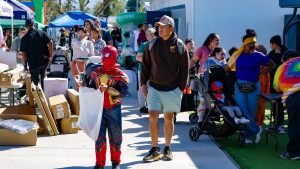By Tanu Henry | California Black Media
Hundreds of thousands gathered at the 19th annual Taste of Soul Festival in Crenshaw — an event dubbed “California’s largest block party” — on Oct. 19.
At the event, California Black Media (CBM) partnered with the California Civil Rights Department (CRD) to spread the word about the California Vs. Hate, a statewide hate crime online resource and telephone hotline, launched in 2023. The system enables Californians to easily report hate crimes and hate incidents.
“Held in the heart of south Los Angeles on Crenshaw Blvd, over half a million people attend the one-day event that brings out the best our community has to offer,” said Brandon Brooks, Stop the Hate project director at California Black Media.
“The festival promotes local businesses as well as it brings out local and statewide resources to assist community members, Brooks continued. “The day has proven to be a great opportunity to speak to people directly and provide information to combat hate crimes and incidents.”
During the event, Brooks said he, James Williams, Community Based Organization Manger for California Vs. Hate and Leah Brown-Goodloe from CBM informed and shared literature with tens of thousands of festivalgoers about the state’s Stop the Hate resources.
CBM’s Stop the Hate outreach was held at the beginning of United Against Hate Week (UAHW), a commemoration held annually across the country to recognize the fight against all forms of hate.
UAHW was first launched in 2018 by elected leaders, staff, and community groups from 13 cities in the Bay Area who organized a “United Against Hate” poster campaign responding to White supremacists marching in Northern California streets in the aftermath of Charlottesville riots.
In 2018, Los Angeles County, LAvsHate, a campaign that provided anti-hate crime information and resources to report hate incidents and hate crimes.
According to CRD director Kevin Kish, the L.A. initiative provided a model for the state’s program.
Today, UAHW has grown into a national movement with events organized across the country to mark the day.
This year, across the state counties and cities acted and held events to mark UAHW, including the launch of a branded UAHW wrap installed on buses by the Santa Clara County Valley Transit Authority.
Not in Our Town, a Northern California-based anti-hate movement, highlighted 131 events across 92 cities.
“Not only were there public gatherings, but also powerful panel discussions, training sessions, and cultural events promoting unity, understanding, and solidarity. These efforts collectively reflect the growing awareness and action against hate in our neighborhoods,” the Not in Our Town statement read.
In June, California Attorney General Rob Bonta released the 2023 Hate Crime in California Report. It included data and resources supporting the state’s ongoing efforts to eliminate crimes and incidents motivated by racial and other biases.
According to the report, hate crimes in California decreased by 7.1% from 2,120 in 2022 to 1,970 in 2023.
However, incidents and crimes against Black Californians remained higher than average with 518 reported cases in 2023. The next highest reporting of bias events was 199 Anti-Hispanic or Latino incidents.
When it comes to reported hate crimes, we know that Black Californians are the most targeted group for hate and discrimination in our state,” said Williams. “The California Civil Rights Department wants people to know that we are committed to reaching the Black community through outreach events and campaigns, including our first-ever billboard campaign, forging new partnerships, or increasing awareness about the hotline and available resources to historically hard-to-reach and underserved Californians.”
The Taste of Soul festival was created by Bakewell Media CEO and executive publisher Danny Bakewell Sr. He said Taste of Soul was created to highlight the positive aspects of African American life and “to encourage the enjoyment, respect and appreciation of our community and each other in an atmosphere of respect, peace, pride and pleasure.”
Brooks, who is from Los Angeles, said he was honored to participate in the event and provide a service to the community, which includes many of his friends and family.
“The event is always a beautiful experience to see family and friends enjoying food, music and resources,” said Brooks.
Williams said he wants to remind all Californians that there is “support when you report!”
“No matter your background or where you come from, if you’ve been targeted for hate, you can get help accessing legal, financial, mental health, and other services by calling 833-8-NO-HATE or by going to CAvsHate.org,” Williams added.
How To Report A Hate Crime:
CA vs Hate is a non-emergency, multilingual hate crime and incident reporting hotline and online portal. Reports can be made anonymously by calling (833) 866-4283, or 833-8-NO-HATE, Monday to Friday from 9 a.m. to 6 p.m. PT or online at any time.
Hate acts can be reported in 15 different languages through the online portal and in over 200 languages when calling the hotline. For individuals who want to report a hate crime to law enforcement immediately or who are in imminent danger, please call 911.
For more information on CA vs Hate, please visit CAvsHate.org.
 Westside Story Newspaper – Online The News of The Empire – Sharing the Quest for Excellence
Westside Story Newspaper – Online The News of The Empire – Sharing the Quest for Excellence









